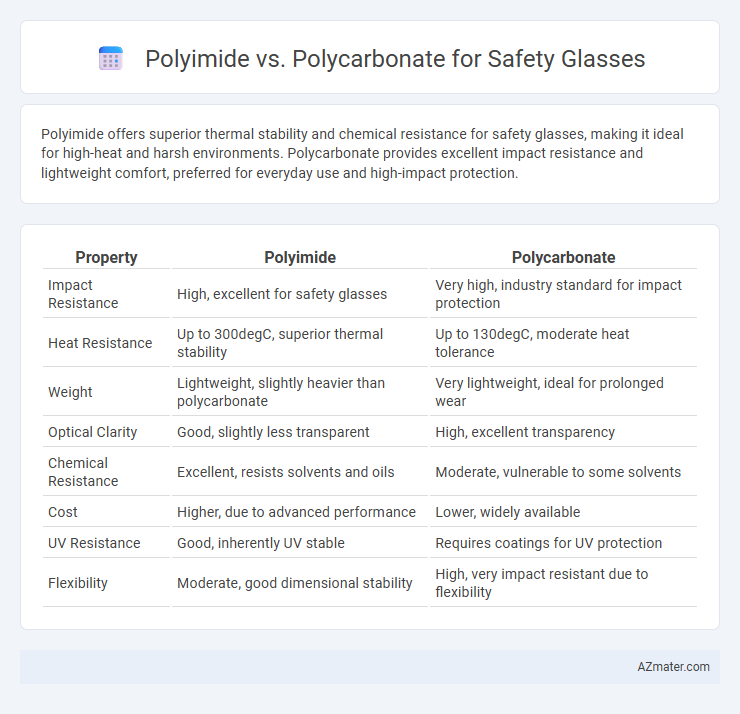Polyimide offers superior thermal stability and chemical resistance for safety glasses, making it ideal for high-heat and harsh environments. Polycarbonate provides excellent impact resistance and lightweight comfort, preferred for everyday use and high-impact protection.
Table of Comparison
| Property | Polyimide | Polycarbonate |
|---|---|---|
| Impact Resistance | High, excellent for safety glasses | Very high, industry standard for impact protection |
| Heat Resistance | Up to 300degC, superior thermal stability | Up to 130degC, moderate heat tolerance |
| Weight | Lightweight, slightly heavier than polycarbonate | Very lightweight, ideal for prolonged wear |
| Optical Clarity | Good, slightly less transparent | High, excellent transparency |
| Chemical Resistance | Excellent, resists solvents and oils | Moderate, vulnerable to some solvents |
| Cost | Higher, due to advanced performance | Lower, widely available |
| UV Resistance | Good, inherently UV stable | Requires coatings for UV protection |
| Flexibility | Moderate, good dimensional stability | High, very impact resistant due to flexibility |
Introduction: Polyimide vs Polycarbonate Safety Glasses
Polyimide and polycarbonate are two commonly used materials for safety glasses, each offering distinct advantages. Polycarbonate provides excellent impact resistance and clarity, making it ideal for high-impact environments. Polyimide, known for its superior chemical resistance and thermal stability, is preferred in environments with exposure to harsh chemicals or high temperatures.
Material Composition and Structure
Polyimide safety glasses feature a polymer composed of imide monomers, providing exceptional thermal stability and chemical resistance due to their highly aromatic backbone and rigid chain structure. Polycarbonate lenses are made from thermoplastic polymers with carbonate groups in their molecular chain, offering superior impact resistance and optical clarity because of their amorphous, glass-like structure. The distinct molecular architectures influence durability and protection levels, with polyimide excelling in high-heat environments and polycarbonate favored for robust impact protection.
Impact Resistance Comparison
Polycarbonate offers superior impact resistance compared to polyimide, making it the preferred material for safety glasses where high-impact protection is crucial. Polycarbonate lenses can withstand impacts at speeds up to 150 feet per second without cracking, meeting ANSI Z87.1 standards, whereas polyimide, though lightweight and flexible, generally provides lower impact resistance and is more prone to deformation under high impact. The enhanced durability and shatterproof nature of polycarbonate ensure optimal safety performance in demanding industrial and sports environments.
Optical Clarity and Vision Quality
Polycarbonate lenses offer superior impact resistance but may exhibit slight optical distortion compared to polyimide, which provides excellent optical clarity with minimal haze and distortion. Polyimide's inherent material properties ensure high visual acuity and accurate color perception, enhancing overall vision quality in safety glasses. Polycarbonate lenses often have a higher refractive index, which can lead to chromatic aberration, whereas polyimide maintains more consistent light transmission for sharper, clearer vision.
Weight and Comfort Considerations
Polyimide safety glasses offer exceptional lightweight properties, typically weighing less than polycarbonate counterparts, which enhances extended wear comfort. Polycarbonate lenses provide strong impact resistance but tend to be heavier, potentially causing discomfort during prolonged use. Choosing polyimide frames reduces strain on the wearer's nose and ears, improving overall comfort without compromising safety standards.
Thermal and Chemical Resistance
Polyimide exhibits superior thermal resistance compared to polycarbonate, withstanding continuous temperatures up to 400degC, making it ideal for high-heat safety glasses applications. In terms of chemical resistance, polyimide resists a wide range of solvents, acids, and bases, whereas polycarbonate is prone to chemical attack and degradation by organic solvents. These properties make polyimide a preferred material for safety eyewear in harsh industrial and chemical environments where both high thermal and chemical resistance are critical.
Durability and Longevity
Polyimide offers exceptional durability for safety glasses, resisting high temperatures and chemical exposure while maintaining flexibility without cracking. Polycarbonate is highly impact-resistant and lightweight, providing excellent protection against physical shocks though it may scratch more easily over time. For longevity, polyimide's superior thermal and chemical stability often results in a longer lifespan under harsh working environments compared to polycarbonate lenses.
Cost Efficiency and Availability
Polycarbonate safety glasses offer superior cost efficiency due to their lower price point and widespread availability compared to polyimide options. Polyimide lenses, while providing better heat resistance and chemical durability, tend to be more expensive and less commonly stocked by suppliers. Choosing polycarbonate frames often ensures easier procurement and budget-friendly replacement without compromising basic protective functionality.
Common Applications in Safety Eyewear
Polyimide safety glasses are favored in high-heat and chemical-resistant environments such as aerospace and industrial manufacturing due to their excellent thermal stability and chemical resistance. Polycarbonate safety glasses dominate applications requiring impact resistance and lightweight comfort, including construction, sports, and laboratory settings. Both materials meet ANSI and OSHA standards, but polycarbonate is more widely used for general safety eyewear because of its superior impact protection and optical clarity.
Choosing the Right Material for Your Needs
Polyimide safety glasses offer exceptional chemical resistance, high-temperature tolerance up to 400degC, and excellent flexibility, making them ideal for harsh industrial environments. Polycarbonate lenses provide superior impact resistance, lightweight comfort, and UV protection, making them suitable for everyday safety use and outdoor applications. Selecting the right material depends on specific safety requirements, including exposure to heat, chemical hazards, and the need for impact durability.

Infographic: Polyimide vs Polycarbonate for Safety Glasses
 azmater.com
azmater.com